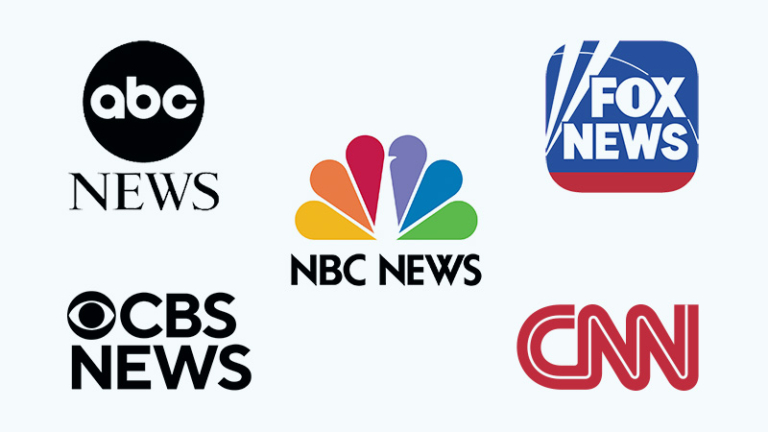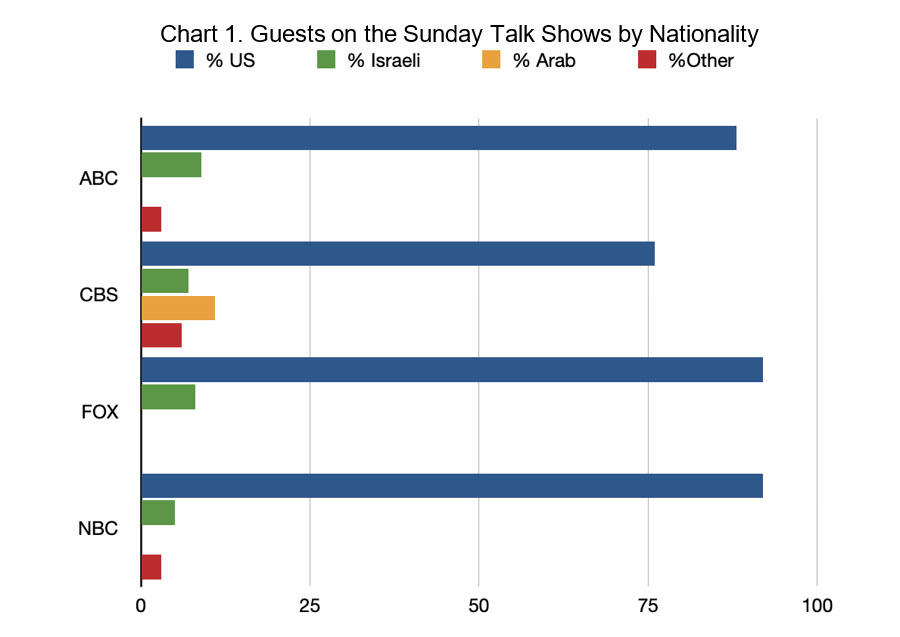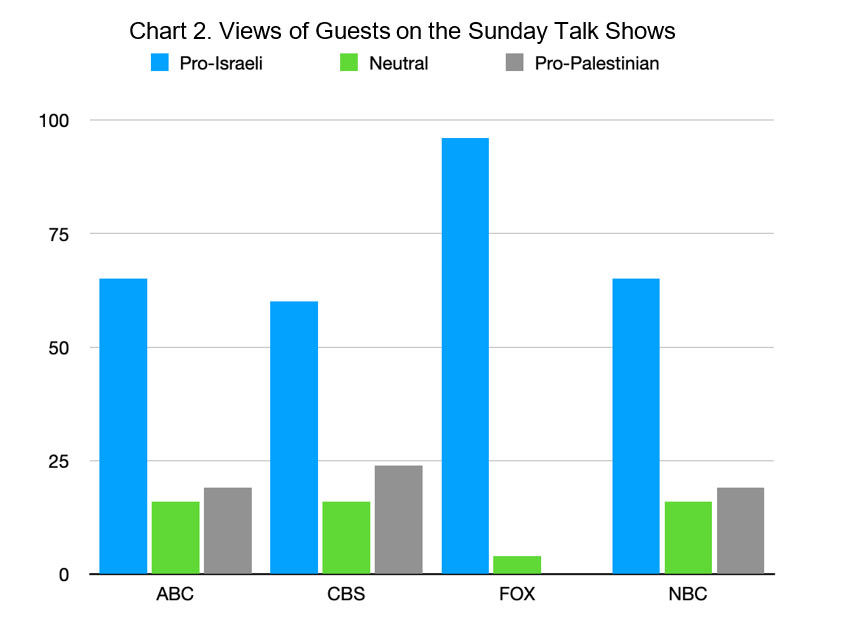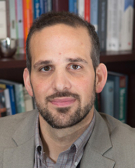
That the American public is not regarded as especially well-informed when it comes to international affairs is conventional wisdom among the US political and news media elite. News organizations have drastically cut back on foreign reporting since the 1980s, citing a lack of audience appetite. Yet, during this time, American global power has expanded. The mismatch between the reach of US foreign policy and the American public’s awareness of what its government does overseas in its name has only grown. The current crisis in Gaza shows the extent to which legacy media in the United States continue to misinform the American public on foreign policy.
Scholars of news and politics have long observed patterns of structural bias in American media coverage of foreign affairs. Namely, American news organizations’ presentations of views on foreign policy largely reflect the range of political elite’s views, as first defined by debate among the most influential members of Congress. If there is no elite disagreement, media coverage tends to be homogenous. Debates may occur over tactics, priorities, or degrees of support, but rarely grapple over the fundamental policies. Due to this pattern of media deference to the political elite, politicians came to assume more power over how Americans perceive world issues, instead of being responsive to public opinion that is well-informed on foreign policy, as democracy theory suggests.
To what extent do legacy media align coverage of Israel’s current war on Gaza with elite political discourse? Are American television news programs a reflection of what the American political elite consider informed coverage? This writer has conducted a content analysis of the coverage of Israel’s Gaza war on the Sunday morning news talk shows on American broadcast networks. The findings are discussed below.
TV News Talk Shows
Traditionally, the most important platforms for political analysis on television in the United States have been the Sunday morning news talk shows on the major networks—NBC, CBS, ABC, and Fox. In past decades, these shows were “an integral part of the Beltway news ecosystem,” according to the Washington Post. Forbes described them as “widely popular political chat shows.” The staple feature of the talk show format is interviews with guests, who include newsmakers, prominent individuals, and current and former officials, followed by news roundtables or panels featuring such officials as well as journalists and experts. Before the interviews, programs typically begin with a produced news package, an edited report bringing together images and voices to tell a story or put forth a news analysis. The video cues up for the audience the main topics of the interviews and roundtables. The networks’ own reporters or analysts may appear throughout the shows, along with shorter video clips to punctuate the interviews. The shows are weekly but are timely and topical, keyed to current events.
On these “Sunday shows,” as Washington insiders call them, government officials and policy experts engage in debates for mass audiences of civic-minded citizens looking to form or affirm their opinions on the leading issues of the day. Over the past few decades, these programs have lost their luster to cable news, talk radio, podcasts, and an array of online forums, including social media. Nevertheless, the linchpin Sunday morning programs have carried on and retain status and influence among the American political elite.
Only one Palestinian national was a guest on any of the shows. By contrast, Israeli guests appeared a total of ten times on all four programs.
The shows’ names are most familiar to middle-aged and older Americans: Meet the Press (NBC), Face the Nation (CBS), This Week (ABC) and Fox News Sunday (FOX), which is not to be confused with the Fox News cable channel despite similarities in partisan bias. These shows are not as dominant within televised news as they once were, but they still command relatively high ratings, ranging from the 908,000 viewers of Fox News Sunday to the 2.78 million viewers of Meet the Press in September, 2023. By contrast, in 2023 the Fox News cable channel, the most popular cable news outlet in the United States, attracted 1.22 million views on average, nearly half the audience of ABC’s This Week (2.5 million). As with most television news, the audiences of these programs tend to be older; about four-fifths of the viewers are over the age of 54. This is the demographic with the highest rate of voter participation in elections.
How have the Sunday news shows discussed Israel’s campaign against Hamas in Gaza? To examine the scale of elite deference, this writer carried out an analysis of these shows’ guests and their remarks during the three months immediately following the Hamas attacks of October 7, 2023. The database Nexus Uni and the programs’ websites provided transcripts from the episodes from October 8, 2023 to January 14, 2024. After removing from the analysis episodes that did not discuss Gaza beyond a mention or two, there were 51 transcripts to analyze. In these transcripts, there were 140 guests, defined as “outside” or invited interviewees and panelists (removing from the analysis those guests employed by the networks as reporters or analysts as well as interviewees in the edited packages). Data were collected on these 140 guests regarding their national affiliation, employer, and job title, and their remarks were ranked on a scale from pro-Israeli to neutral to pro-Palestinian. Finally, word frequencies were counted for key frames on the conflict, such as “hostages,” “occupation,” and “ceasefire,” among others.
Findings
The overwhelming majority of guests—120 out of 140—were American. While this seems logical given that the programs are broadcast from studios in the Washington, DC, area, this was not by necessity. Not all the guests appeared in studio. Many appeared remotely, showing that it was technically possible to book guests outside of the United States. Most notably, not one of the American guests were of Palestinian heritage or even Arab-American. Three American guests were of South Asian Muslim heritage, but only two of them expressed pro-Palestinian views. The third works for a conservative think tank and was far more sympathetic to Israel in his comments than the other two.
Israelis made up the second most common nationality, 7 to 9 guests, representing only 5-9 percent of them (see chart 1). Only one program, CBS’s Face the Nation, had any Arab nationals as guests, but they were relatively well represented on that show, making up 11 percent of all the guests who appeared.
Notably, only one Palestinian national—Hussam Zomlot, the head of the Palestinian Mission to the United Kingdom—was a guest on any of the shows. He appeared on Face the Nation on November 5, 2023.1 By contrast, Israeli guests appeared a total of ten times on all four programs. These guests included the spokesperson for the Israeli Army, the Israeli ambassador to the United States, Israel’s President Isaac Herzog, and Israel’s Prime Minister Benjamin Netanyahu.
From this guest-booking pattern—ten times as many Israeli guests as Palestinians—it is expected that pro-Israel views would be dominant, except that both Israeli and Palestinian interviewees were few compared to the prevalence of American guests. What really matters, then, is what these Americans were saying.
The views expressed by American interviewees and panelists were overwhelmingly pro-Israel. These guests were more than twice as likely to sympathize with Israel than with the Palestinians. As chart 2 shows, there was some variation worth noting. Fox News Sunday was an outlier with a whopping 96 percent of guests expressing pro-Israel views.2 The other programs were surprisingly consistent, with between 60 and 65 percent of American guests expressing support for Israel. While Palestinian sympathizers were the most common on CBS’s Face the Nation, making up 24 percent of all guests, they represented only 19 percent of the guests on NBC’s Meet the Press and ABC’s This Week.
While one in five guests expressed more sympathy toward Palestinians than toward Israel, there is an essential footnote about the tenor of such guests’ remarks. With few exceptions, these guests focused on the humanitarian aspect of the Gaza war, emphasizing the scale of Palestinian civilian suffering due to Israel’s bombardment and invasion. This is because many of these sympathizing with Palestinians are the heads of humanitarian organizations such as Save the Children, the World Food Programme, and Doctors Without Borders. By contrast, only two pro-Palestinian guests discussed at-length Palestinian political aspirations or the larger political context. Besides Zomlot, Jordan’s Ambassador to the United States Dina Kawar did so in her November 19 appearance on Face the Nation.
These findings suggest what scholars of news and politics have long known: American broadcast news coverage reflects the dominant discourse among the political elite in the United States. Eighty-two percent of guests (115 out of 140) on the Sunday news shows analyzed for this article were current or former US government officials. Given the lopsided nature of US foreign policy as resolutely pro-Israel, it is expected that framing in these talk shows would disproportionately reflect pro-Israel positions even though Israeli guests were a small percentage of those who appeared.
Bias in Framing
How would the guest booking patterns identified above affect these shows’ framing of Israel’s Gaza campaign? Due to the paucity of Palestinian and Arab perspectives, the key contexts that identify deep problems with Israeli policies were nearly absent. For example, the word “occupation” was mentioned only 15 times in the 51 programs analyzed, and it was mostly the Arab guests who did so. They presented Israel’s response in Gaza as a direct result of its military occupation of the enclave since 1967, which Palestinians have used a wide variety of tactics to try to end. The frame of Israel’s military occupation provides an analytical context that explains both the October 7 attack and the nature of Israel’s military response, as well as the basis for potential peace moving forward. Yet, it was barely mentioned during three months of these talk show episodes.
Israel’s military occupation was barely mentioned during three months of these talk show episodes.
By contrast, guests uttered the word “hostages” 529 times, a ratio of 35 mentions to one mention of “occupation.” The Israeli hostages in Gaza were brought up ten times per program on average. Hamas and other groups declared that they took hostages to secure the release of Palestinian prisoners, many of whom Israel holds without charge. Yet, Palestinian prisoners were mentioned only 17 times. The guests’ repeated mention of Israeli hostages and their avoidance of the history of military occupation and Palestinian prisoners was a glaring example of media bias.
So one-sided was the discourse on these shows that many guests avoided uttering “Palestinians” at all. As a baseline, guests mentioned Israel 2,282 times. Hamas was brought up half as frequently (1,108 times). Yet, Palestine or Palestinians—who have borne the brunt of Israel’s war on Gaza—merited only 456 mentions, less than half as often as Hamas. This signifies a preferred framing of the war as a conflict between Israel and Hamas, which distracts from Israel’s systematic punishment of Palestinian civilians. The infrequent mention of “Palestinians” is related to who was booked as guests. Nearly half of the mentions of Palestinians occurred on CBS’s Face the Nation, the only program that featured any Arab guests.
Another apparent framing pattern concerns how to end the Gaza crisis. Despite “ceasefire” being the prevailing demand of a vibrant US protest movement, of a growing number of US lawmakers, and of many world leaders, it was hardly discussed. “Ceasefire” was brought up only 94 times on all the shows. More than half of these mentions were on Fox News Sunday, where guests roundly opposed the idea. In other words, on the rare occasion when guests mentioned a ceasefire, it was to be rejected as a means to retrieve Israeli hostages in lieu of Israel continuing its destructive military bombardment and invasion of Gaza.
Even more scarce than “ceasefire” was the term “genocide,” which was uttered by guests just 23 times. And only once was it applied to Israel’s conduct in Gaza, despite widespread application by scholars, international lawyers, and governments, most notably South Africa in its complaint before the International Court of Justice (ICJ) in early January 2024. The lone appearance was when a host of one show read a social media post by Rep. Rashida Tlaib (D-MI) regarding the ICJ case. But the overwhelming majority — 20 of the mentions — repeated the erroneous claim that American university campus protest slogans are calls for genocide against Jews. That these shows dedicated more time to discussion of rhetorical claims of hypothetical genocide rather than whether Israel’s killing of tens of thousands of Palestinians constitutes genocide is emblematic of the deep bias built into US media. The same pattern is evident in the 25 occurrences of the word “massacre.” Every single time a guest used the word “massacre,” it was in reference to the October 7 attack, never for any of the subsequent Israeli attacks on Palestinians that have killed more than 26,000 Palestinians.
Conclusion
The patterns of bias in guest booking, in the range of views expressed by guests, and in the framing of issues are consistent with the prevailing theory of media bias in coverage of foreign policy—that American news media tend to limit the range of discussion to views acceptable among the most powerful of the American political elite. Given the strongly pro-Israel tilt in US foreign policy, these findings are not surprising. But they do reflect an abandonment of the ideal that news media’s purpose is to scrutinize government policies and the actions of those in power and to inform the public so it can forge independent opinions.
What is surprising here is the extent to which the bias manifested. That the Sunday news shows on ABC, NBC, and FOX failed to include a single Palestinian guest (while CBS only had one) is an astounding failure at a time when many parts of American society are becoming more attentive to diversity and self-representation in news. That ten times as many Israeli as Palestinian guests were booked is alarming. Yet no data point should be as worrisome as the fact that officials in the Biden administration and Democratic lawmakers were among the main producers of pro-Israel messaging, accounting for 43 percent of the guests who espoused the most sympathy for Israel.
Many observers of the changing media ecology had speculated that the rise of social media and online news would reduce elite influence over the interpretation of events. This has not shown itself in the Sunday shows, but that does not mean the elite are not worried. The panic over the social media platform Tik Tok, which is popular among younger Americans who do not watch the mainstream news shows, might be the result of elite anxiety over the decline in gatekeeping power that privileges their messages. Social media producers do not limit discourse on foreign affairs to the narrow outlooks of elected officials and other elites. On Tik Tok, X, or Instagram, citizens are exposed to a much wider variety of analyses by an extremely diverse array of people. It is no surprise that poll after poll shows that the segment of the US population expressing the most concern for the Palestinian people is also the most likely to obtain their news from social media platforms.
The views expressed in this publication are the author’s own and do not necessarily reflect the position of Arab Center Washington DC, its staff, or its Board of Directors.
1 The only other Palestinian interviewed was Marwan Al Ghoul, a producer for CBS in Gaza, but he was not included in these findings because he is a CBS employee.
2 Yet, Fox News Sunday’s website claims that “This show’s weekly guest roster is among the most diverse in Sunday morning talk.”



